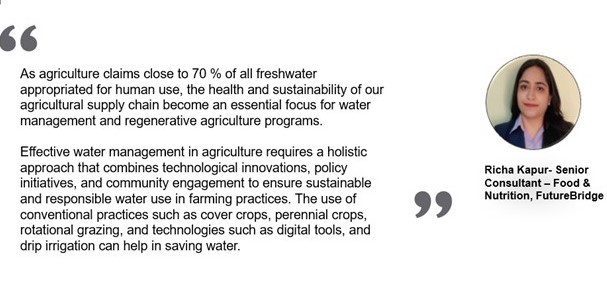Water for Peace – Farming Strategies Empowering Sustainability
Executive Summary
The UN World Water Development Report 2023, published by UNESCO, issues a stark warning: the world is facing an impending global water crisis. By 2050, the number of people in urban areas experiencing water scarcity is projected to double from 930 million in 2016 to approximately 2.4 billion. To tackle this pressing global need, industry stakeholders have spearheaded numerous initiatives aimed at improving water usage efficiency and conservation.
Every year on March 22nd, the United Nations General Assembly marks World Water Day to raise public awareness about water’s critical significance and the imperative to protect it. This year’s theme, ‘Water for Peace,’ underscores water’s indispensable role in fostering global stability and prosperity.
Water is the lifeblood of the food and nutrition industry, touching every aspect from agricultural production and raw material sourcing to manufacturing and consumer use. This article analyzes a few innovative farming initiatives within the industry contributing to water conservation efforts. By rallying together and intensifying our dedication, we can forge significant advancements toward a world that is both sustainable and secure in its water resources.


Introduction
Water conservation is a critical priority for the agriculture sector, which stands as one of the foremost consumers of freshwater on a global scale. In the face of escalating population growth and increasing food demands, the judicious management of water resources emerges as a fundamental necessity for ensuring global sustainability. By implementing rigorous water conservation measures, farms not only maximize resource efficiency but also safeguard their resilience and longevity in the long run.
The consequences of unchecked water consumption in agriculture extend beyond individual farms, potentially leading to severe environmental degradation. Groundwater depletion, soil erosion, and habitat destruction are among the detrimental outcomes that can arise from excessive water use. Implementing water conservation practices in agriculture represents a proactive response to these challenges, offering a pathway to mitigate adverse environmental effects and safeguard precious ecosystems. Additionally, the adoption of water-efficient farming practices yields tangible economic benefits for agricultural operations. The adoption of water-efficient farming practices not only reduces production costs but also minimizes reliance on irrigation, pumping, and water treatment. This is especially crucial in water-stressed regions where efficient water management is essential for agricultural viability.


Harnessing Waterwise Innovations for Water Conservation
Emerging technologies in agricultural water conservation encompass precision irrigation, drip systems, soil moisture monitoring, and desalination. These innovations optimize water utilization, minimize waste, and alleviate the effects of water scarcity on farming. Moreover, rainwater harvesting, water recycling, and remote sensing present promising approaches for sustainable water management in agriculture. Implementing these technologies empowers farmers to enhance productivity while preserving critical water resources for future generations. These technologies include:
- Integrating Human-Centered Landscapes: Permaculture design prioritizes efficient water usage within systems, ensuring only clean water flows into local watersheds, fostering ecological harmony and sustainability.
- Harnessing Perennial Plants for Sustainable Agriculture: Perennial plants such as Kernza offer multiple growing seasons, enhancing soil health, carbon sequestration, and water infiltration, thereby bolstering agricultural sustainability and resilience.
- Enhancing Pasture Resilience: Rotational grazing practices optimize water absorption, minimize runoff, and cultivate drought-resistant pastures by increasing soil organic matter and enhancing fodder coverage, fostering sustainable land management.
- Maximizing Water and Fertilizer Efficiency: Controlled irrigation methods like fertigation through drip systems improve crop yield and fertilizer use efficiency, showcasing how innovative technologies can enhance water management and agricultural productivity.
- Efficient Water Utilization: Agricultural water-saving devices, including soil layers and drainage systems, effectively store and utilize rainwater during dry seasons, optimizing farmland utilization and minimizing water wastage for sustainable water resource management.
- Leveraging Data for Decision-Making: Digital platforms like Climate FieldView provide real-time insights into soil health, weather patterns, and crop conditions, empowering farmers to optimize irrigation efficiency and embrace sustainable practices.
These innovative technologies empower farmers to sustainably manage water resources, enhance agricultural conservation efforts, and adapt to evolving environmental conditions.
Government and Organizational Initiatives Driving Impact
Governments and organizations are spearheading various initiatives to promote water conservation in agriculture. This includes agricultural corporations investing in technology and sustainable practices, NGOs collaborating with farmers and advocating for policy changes, research institutions developing innovative solutions, government agencies implementing regulations and incentives, international organizations providing funding and support, and farmers’ associations facilitating knowledge exchange and advocacy. For instance,
- The Indian government has launched an initiative known as Pradhan Mantri Krishi Sinchayee Yojana (PMKSY) to address water scarcity challenges in agriculture. Through PMKSY, the government aims to enhance physical access to water for agricultural purposes, expand cultivable areas under assured irrigation, improve farm water use efficiency through modern technologies and practices, and introduce sustainable water conservation measures. This comprehensive scheme encompasses various components such as the Accelerated Irrigation Benefit Programme (AIBP), Har Khet Ko Pani (Water to Every Field), Per Drop More Crop, and Watershed Development to ensure water security for farmers and promote sustainable agricultural practices.
- EU Green Deal – An initiative and policy by European authorities that provides standard knowledge on agricultural water conservation through improved irrigation practices. Local governments offer incentives like grants or tax credits for implementing eco-friendly practices such as rain barrels or drip irrigation. Private organizations collaborate with farmers to create cost-effective filtration systems for capturing clean rainwater runoff during dry periods.
- The United Nations has launched the International Decade for Action initiative, which includes triennial World Irrigation Forums hosted by The International Commission on Irrigation and Drainage. These forums serve as a gathering point for stakeholders in agricultural water management to collaborate, disseminate multidisciplinary tools, and catalyze action among national agencies.
These collective efforts by governments in agriculture aim to address water scarcity challenges, enhance water resilience in farming communities, and ensure the sustainable use of water resources in agriculture.


Leading Initiatives Powering Sustainable Impact: Big Players Driving Change
Several companies are actively engaged in initiatives to promote water conservation in the agriculture industry. For instance,
Danone – Danone has developed a water strategy based on three pillars: preserve water resources, drive water circularity, and provide safe drinking water. Danone is leading the regenerative agricultural transformation with a 25% reduction in water consumption for Danone’s direct farmers. Danone has developed water stewardship plans for sustainable water management and proper governance at the watershed level in collaboration with local communities, water users, providers, and authorities.
The Coca-Cola Company—Coca-Cola announced an ambitious plan to ensure water sustainability worldwide by 2030, focusing on regenerative practices, watershed health, and community resilience. The company announced three goals for accelerating its action on water during the UN 2023 Water Conference. The company’s holistic 2030 water strategy aims to achieve water security in its operations, local watersheds, and communities, sources agricultural ingredients for beverages, and touches people’s lives.
Key Takeaways
- Efficient water management in agriculture is essential for global sustainability due to its significant freshwater consumption. Conserving water optimizes resource utilization and ensures long-term viability, especially given the increasing demand for food and the environmental impacts of excessive water use.
- Emerging technologies such as precision irrigation, drip systems, and desalination offer promising solutions to improve water efficiency and mitigate the impact of water scarcity on farming. These innovations enable farmers to enhance productivity while preserving precious water resources.
- Governments, NGOs, research institutions, and international organizations collaborate on various initiatives to promote water conservation in agriculture. Major companies like Danone and The Coca-Cola Company are actively engaged in initiatives to promote water conservation in the agriculture industry.
- The adoption of water-saving technologies and sustainable practices enhances water efficiency and conservation and improves soil health, biodiversity, and livelihoods. By addressing water scarcity challenges and promoting sustainable water management, stakeholders aim to ensure agriculture’s long-term resilience and sustainability.
Drive water conservation efforts with innovative solutions. Together, let’s create a sustainable and secure future by propelling your journey towards sustainable water conservation. Discuss your business requirements with our Food & Nutrition experts




































